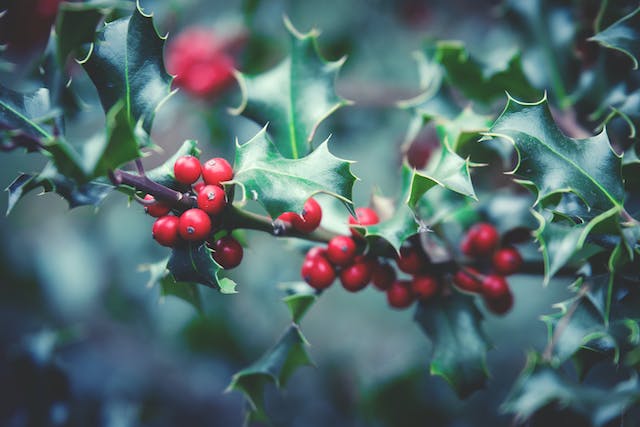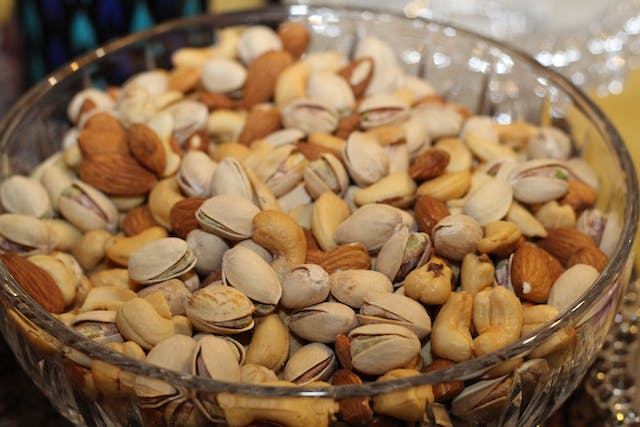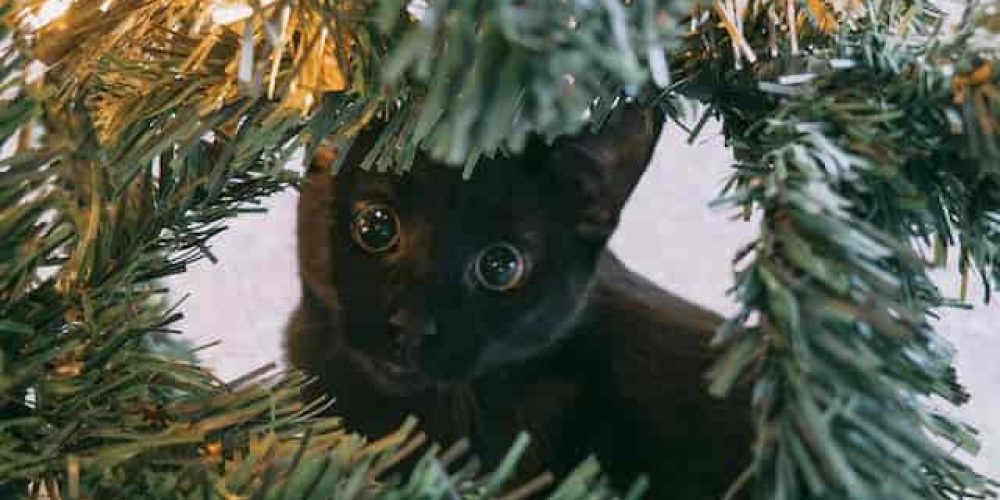Christmas trees, Christmas cactus, flowers, trees and nuts – what’s harmful among the Christmas plants?

Many plants and trees contain defensive substances that can be very irritant to the gut and cause a bad tummy upset, with a few being outright poisonous. Leaves that are hard and pointy, or jagged, can also cause some damage. On the other hand, many types of nuts consumed by people are ok to eat in small amounts. There are a couple of exceptions, with macadamia nuts being the most dangerous one. Even so, all types of nuts are high in fat and should not be given to pets with a sensitive tummy or at risk for pancreatitis.
Why can trees, flowers and nuts be harmful?
This will depend on the specific plant. Common ones are:
- Holly (Ilex aquifolium): the sharp and pointy leaves can cause damage, but more commonly, it’s saponins and other substances in the berries and leaves that cause a very upset stomach. Most of the time, this can be treated by letting the stomach rest for a few hours and then feeding a bland diet for a couple of days. If the vomiting or diarrhoea are severe, veterinary treatment may be required.
- Amaryllis: the leaves and petals of these beautiful flowers can cause a mild tummy upset, but this can be more serious if bulbs are ingested. Starving for a few hours and giving a bland diet works well in most cases.
- Poinsettia (Euphorbia pulcherrima): despite belonging to a family of very toxic plants, the common variety is much less dangerous. Still, the sap can cause some irritation to the skin, eyes and stomach. Any exposure should be rinsed off thoroughly, especially if around the eyes. Drinking lots of water helps with any ingestion.
- Mistletoe, the American variety (Phoradendrum serotinum) only causes a mild tummy upset, but the European variety (Viscum album) can affect the heart rate and blood pressure if ingested. Even so, toxicity is low and it is unlikely for serious problems to develop.
- Christmas trees: these only tend to cause trouble if the pet ingests large amounts of needles, bark or a cone. These can be irritants, but the greater concern is they can cause a blockage. A nibble is no cause for concern, but speak to a vet straight away if there are signs of tummy pain and vomiting.
- Christmas cactus (Crab’s claw cactus or Schlumbergera truncata): ingestion can cause a mild or moderate tummy upset. A short tummy rest and a bland diet for a few days tend to work well. In cats, incoordination may develop, speak to a vet if you notice your cat is not moving normally.
- Yew (Taxus species): Ingesting any part of the plant other than the flesh of the fruit can cause vomiting, diarrhoea, tremors and problems with the heart rate and blood pressure. Speak to a vet straight away if your pet has been chewing on Yew.
- Ivy (Hedera species): part of some Christmas arrangements, ivy leaves can cause skin irritation on contact and a stomach upset if ingested. Rinse any irritated skin thoroughly and encourage drinking plenty of water.
- Macadamia nuts: these are toxic and can cause severe weakness, tremors and vomiting. Speak to a vet if your pet ingested any.
- Black walnuts: this type of walnut is not consumed by people, but both the nut and the sap can be toxic to dogs. It can cause a tummy upset, tremors and incoordination.
- Nuts in general are prone to getting mouldy, and these moulds produce toxins that can be very toxic. Immediately dispose of any mouldy nuts in a way your pet cannot access.
- Other nuts, such as pistachios, cashews and pine nuts, are not recommended due to their high fat content but are not dangerous if small amounts are ingested.

You can find more information about other harmful plants in our poisonous plant article.
How to prevent problems from plants, trees and nuts
- Prevention is better than cure! If possible, try to make sure you only have pet-safe decorations around the house.
- Make sure any plants of concern are somewhere out of reach.
What to do if my pet chews on something that could be harmful
If your pet has contact with an irritant plant, rinse or bathe the area thoroughly with plenty of water. If they are showing signs of discomfort or swelling develops, speak to a vet.
Any contact with an irritant around the eyes should have a vet check.
If your pet vomits but is otherwise bright and happy:
- Try withholding food for a few hours to let their tummy rest.
- Reintroduce food very gradually.
- This may be enough to settle their tummy. You can find more information in our vomiting article.
Speak to a vet straight away if:
- Vomiting continues or they are becoming quiet and lethargic
- Diarrhoea is very frequent, there is a significant amount of blood in it or they seem excessively tired or distressed
- Your pet’s tummy appears swollen or bloated, especially if they are also retching or lethargic.
Joii vets are there to help you if you have any questions. And we’re available online 24/7 every day, even during the festive period.
What not to do if your pet has a tummy upset
- Don’t force your pet to drink water if they are vomiting repeatedly. This can actually worsen dehydration. Speak to a vet for treatment.
- Resting the stomach is very helpful after vomiting, but puppies and kittens should not be starved for more than a few hours.
- Even if the symptoms are mild, a tummy upset lasting more than a couple of days is likely to require treatment or investigation.
- Don’t delay speaking to a vet if your pet still has symptoms after two or three days or can only cope with eating bland food at that point.
Joii can help with:
- Treating tummy upsets at home and recognising emergencies
- Safe food for pets at Christmas
- Anything that’s worrying you about your furry friend’s health and wellbeing at Christmas
Wishing you a happy Christmas from all your pet family friends at Joii.

Coming soon….on the fifth day of Christmas
Christmas can be stressful sometimes, especially for timid pets. But there are ways to help them cope.











